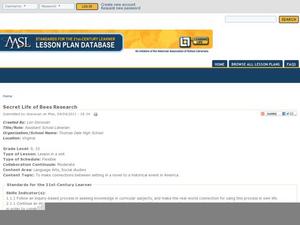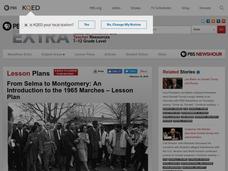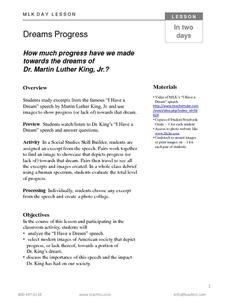Curated OER
The Role of Affirmative Action in the Civil Rights Movement
Learners debate Affirmative Action. In this Civil Rights lesson students examine the development of affirmative action. Learners discuss whether affirmative action is advancing equality and civil rights or not.
Newseum
Civil Rights: The Five Freedoms
After a close reading of the First Amendment and the five freedoms it guarantees, class members examine the civil rights timeline to see how civil rights groups applied these freedoms to create change. Using the issue the class chose in...
Newseum
Civil Rights: Your Stories of Change
Young activists examine local civil rights issues presented in news media sites to determine what elements make these stories attention-grabbing and trustworthy. Using this information and their worksheets from the first two lessons in...
National Woman's History Museum
Fannie Lou Hamer and Social Activism
Not all heroes wear capes. An impactful lesson focuses on the life and activism of Fannie Lou Hamer during the civil rights movement. Scholars read her speeches and other material, participate in group discussion, and complete a jigsaw...
Described and Captioned Media Program
Malcolm X: Make It Plain, Part I
Malcolm X was a complicated man that few in white America understood. After sharing what they know or think they know about this civil rights leader, about nationalism and Black Nationalism, class members view a two-part documentary...
K20 LEARN
Analyzing The "I Have A Dream" Speech
The famous words of Martin Luther King still resonate with scholars today. An enlightening lesson helps pupils examine the "I Have a Dream" speech in more depth and learn what impact it had on the civil rights movement. Young historians...
Center for History Education
Continuity or Change? African Americans in World War II
While World War II was a pivotal moment in history, historians debate its importance to the civil rights movement. Class members consider the implications of segregation and the war using a series of documents and a jigsaw activity....
Adult Fiction by Jewell Parker Rhodes
Ghost Boys: Educator Guide
The spirit of the Civil Rights Movement lives on in a more literal than figurative way in Ghost Boys. A focused lesson plan features Jewell Parker Rhodes' novel about ghosts of slain black teenagers, including the main character, Jerome,...
Facing History and Ourselves
Eyes on the Prize Lesson 1: The Philosophy of Nonviolence
Young scholars explore the concept of nonviolent demonstration. In this Civil Rights Movement activity, students investigate examples of injustice and discuss the philosophy of nonviolence fueled by leaders of the movement. Young...
Curated OER
Martin Luther King Jr.: From Civil Rights to Human Rights
Students read essays and participate in a discussion that examines Dr. Martin Luther King, Jr.'s stance on both civil rights and the broader issue of human rights. They conduct research about King's life and work, analyze quotes from his...
Center for Civic Education
Citizenship Schools and Civic Education During the Civil Rights Movement and in the Present
Your young historians will discover the importance that citizenship education has played in the social progress of the United States as they learn about early efforts to discourage African Americans from voting in the 1960s.
Curated OER
Secret Life of Bees Research
The Secret Life of Bees provides high schoolers an opportunity to connect the events in the novel to events in America’s history. After choosing a topic from a provided list, individuals research how the event affected the Civil Rights...
PBS
From Selma to Montgomery: An Introduction to the 1965 Marches
The 1965 Civil Rights marches from Selma to Montgomery and the resulting Voting Rights Act of 1965 are the focus of a social studies lesson. The resource uses film clips to inform viewers not only about the discrimination that gave rise...
C-SPAN
Last Days of Martin Luther King, Jr.
On April 4, 1968, Dr. Martin Luther King, Jr. was assassinated in Memphis, Tennessee. Four video clips reveal the events of that time, including the shift in the focus of the Civil Rights Movement, the aftermath of the assassination, and...
National Endowment for the Humanities
"Sí, se puede!": Chávez, Huerta, and the UFW
"Sí, se puede!" Cesar Chavez and Dolores Huerta believed organizing farm workers and changing their working conditions were possible. Scholars examine provisions of the Bracero Program, videos, and the United Farm Workers' (UFW) work....
Curated OER
Rights-Minded
Students expand their knowledge and understanding about the civil rights movement by investigating the lives of some of the people who contributed to it.
TCI
Dreams Progress
Has society progressed to the dream Martin Luther King Jr. expressed in his famous address during the civil rights movement? Learners work with a partner to analyze one excerpt from King's "I Have A Dream" speech and find a current image...
Albert Shanker Institute
Strategizing for Freedom
Booker T. Washington, W.E.B. DuBois, Marcus Garvey, and A. Philip Randolph developed different views on how to advance civil rights for African Americans. Class members research these famous figures and their strategies before developing...
Curated OER
Marching On
Young scholars explore the increasingly diverse civil rights movement by researching and profiling its key issues, main organizations, and top leaders.(August 25, 2003)
Curated OER
And You Don't Stop - 30 Years of Hip-Hop, Episode 2, Lesson 1
Students discuss Public Enemy's lyrics and compare and contrast them with songs popular during the Civil Rights Movement. They write their own rap song that expresses feelings of oppression or freedom from oppression.
Curated OER
New Voices for African Americans
Eleventh graders study Malcolm X and black power. In this African American lesson, 11th graders write a journal entry about black power and create a timeline of the events during the civil right movement.
Curated OER
Nonviolence the Road to Freedom
Eleventh graders discuss the use of nonviolence. In this civil rights movement lesson, 11th graders write a journal entry on the differences between Rosa Parks and Martin Luther King Jr., discuss nonviolence and create a poster...
Curated OER
Say It Loud!: A Celebration Of Black Music In America
Students watch a video that highlights the role of artists' images throughout the history of Black music in the United States and describe the influences of the civil rights movement on Black culture.
Curated OER
The Election of Barack Obama 44th President of the United States
High schoolers consider the historic implications of Barack Obama's election. In this election of 2008 lesson, students research Obama's accomplishments and determine how his election signifies the success of the American Civil Rights...

























